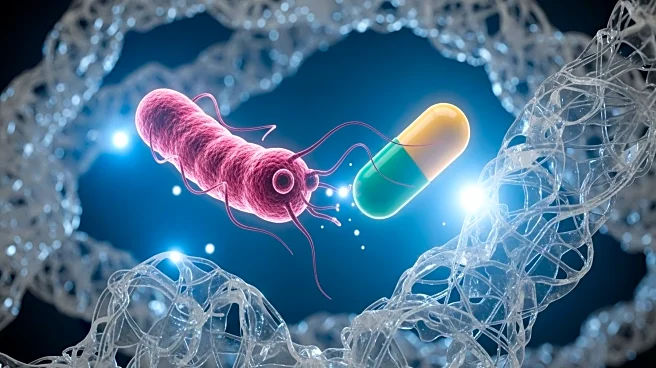What's Happening?
Researchers at the University of Edinburgh have genetically engineered the bacterium Escherichia coli (E. coli) to convert plastic waste into paracetamol, a common painkiller. This innovative approach utilizes E. coli's ability to digest plastic-derived molecules, showcasing its potential in biotechnology. E. coli, traditionally known for its role in genetics and molecular biology, has been used industrially to produce various pharmaceuticals and chemicals. The bacterium's adaptability and efficiency make it a valuable tool in transforming waste into useful products, such as vanilla flavor and perfume. The research highlights E. coli's dominance in biotechnology due to its fast growth, ease of manipulation, and ability to host foreign DNA.
Why It's Important?
The development of E. coli to convert plastic waste into painkillers represents a significant advancement in sustainable biotechnology. This approach addresses environmental concerns by reducing plastic waste and offers a cost-effective method for producing pharmaceuticals. The use of genetically engineered bacteria could revolutionize waste management and pharmaceutical production, potentially reducing reliance on traditional manufacturing processes that are resource-intensive and environmentally damaging. This innovation could lead to more sustainable practices in the pharmaceutical industry, benefiting both the environment and public health.
What's Next?
The success of this research may encourage further exploration of genetically engineered microbes for waste conversion and pharmaceutical production. Researchers might investigate other bacteria that naturally possess similar capabilities, potentially leading to more efficient and diverse applications. The biotechnology industry could see increased investment in developing microbial solutions for environmental and health challenges, fostering collaborations between academic institutions and commercial entities. Regulatory bodies may also need to adapt to these advancements, ensuring safe and ethical use of genetically modified organisms in industrial applications.
Beyond the Headlines
The use of E. coli in biotechnology raises ethical and safety considerations regarding genetic engineering and its impact on ecosystems. While the bacterium offers promising solutions, there is a need for careful assessment of potential risks associated with releasing genetically modified organisms into the environment. Additionally, the dominance of E. coli in research may limit exploration of other potentially beneficial microbes, suggesting a need for broader scientific inquiry into microbial diversity and capabilities.










